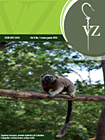Authors
Abstract
Milk production in the intertropical region has been based on the crossbreeding of Bos taurus taurus with Bos taurus indicus breeds, generating products of high hybrid vigor as the F1 mix breed with high productive-reproductive potential and resistance to the environment. The dairy productive performance and the reproductive performance of F1 Holstein x Brahman cows in a herd raised in warm climate in the municipality of Cartago, Valle del Cauca, Colombia were evaluated. Records for age at first calving (AFC, n=23), Calving Interval (CI, n=60), milk production per lactation (n=71) and lactation persistency (LP, n=67) in crossbreeding of Holstein bull with Brahman cows were evaluated; the cows were milked twice a day with calf support and supplementation per milking lot. The AFC was 31.3±4.12 months; the average of CI was 423.46±111.26 days; milk production average per lactation was 3052±785 kg, with a range between 540 and 3471 kg. The average LP was 54.22±17.59%, with persistency higher than 60% until the third lactation and lower than 40% after the seventh lactation. In conclusion the productive and reproductive performance in F1 Holstein x Brahman cows is optimum and superior compared to the Colombian double purpose cattle national parameters. F1 Holstein x Brahman cows are long lived reaching ages of 139 months (11.5 years) with eight (8) lactations, milk production per lactation higher than 3000 kg and persistency close to 40%. Nevertheless, this genetic potential is only shown under good nutritional management.
References
Berry, D.P.; Cromie, A.R. Associations between age at first calving and
subsequent performance in Irish spring calving Holstein-Friesian dairy cows. Livestock Science, v.123, n. 1, p. 44-54, 2009.
Bohmanova, J.; Misztal, I.; Tsuruta, S. et al. National genetic evaluation of milk yield for heat tolerance of United States Holsteins. Interbull Bulletin, v. 33, p. 160-162, 2005.
Campos, G.R.; Cubillos, C.; Rodas, A.G. Indicadores metabólicos en razas lecheras especializadas en condiciones tropicales en Colombia. Acta Agronómica, v. 56, n. 2, p. 85-92, 2007.
Cerón-Muñoz, M.F.; Tonhati, H.; Costa, D. et al. Interação genótipoambiente em bovinos da raça Holandesa brasileiros e colombianos. Arch. Zootec., v. 53, p. 239-248, 2004.
Cole, J.B.; Null, J. Genetic evaluation of lactation persistency for five breeds of dairy cattle. Journal of Dairy Science,v. 92, n. 5, p. 2248- 2258, 2009. doi:10.3168/jds.2008-1825.
Córdova-Izquierdo, A.; Saltijeral-Oaxaca, J.; Rodríguez-Ariza, G. et al.
Comportamiento reproductivo de razas bovinas de carne europeas en condiciones de trópico húmedo mexicano. REDVET, v. 6, n. 11, p. 1-5, 2005.
Ferris, C.P.; Patterson, D.C.; Gordon, F.J. et al. Calving traits, milk production, body condition, fertility and survival of Holstein-Friesian and Norwegian red dairy cattle on commercial dairy farms over 5 lactations. Journal of Dairy Science,v. 97, n. 8, p. 5206-5218, 2014.
Freitas, M.S. Utilização de modelos de regressão aleatória na avaliação genética de animais da raça Girolando. Viçosa, Brasil: Universidade Federal de Viçosa, 2003. 89p. Tesis (Doctorado en Zootecnia).
Freitas, A.F.; Costa, C.N.; Menezes, C.R.A. et al. Programa de melhoramento da raça Girolando-teste de progênie: sumario de touros 2008. 1. ed. Juiz de Fora, Brasil: Embrapa Gado de Leite, 2008. 20p.
Grajales, H.; Hernández, A.; Prieto, E. Age and weight at puberty and their relation with reproductive efficiency of cattle breed in the Colombian tropics. Livestock Research for Rural Development,v. 18, n. 139,2015. Available in: http://www.lrrd.org/lrrd18/10/graj18139.htm.
Herrera, J.A.; García, A.; Suárez, J. Prospective analysis o the feeding basis in a tropical dairy farm with linear programming. Pastos y Forrajes, v. 37, n. 4, p. 435-441, 2014.
Hoque, M.; Hodges, J. Genetic and phenotypic parameters of lifetime production traits in Holstein cows. J. Dairy Sci.,v. 63, p. 1900-1910, 1980.
Leblanc, S. Assessing the association of the level of milk production with
reproduction performance in dairy cattle. Journal of Reproduction and Development,v. 56, suppl. P, S1-S7. 2010.
Magaña, J.G.; Parra-Bracamonte, G.M.; Estrada-León, R.J. et al. Characterization of animal genetic resource in the desing of sustainable cattle production system in the tropics. Tropical and Subtropical Agroecosystems,v. 10, p. 85-94, 2009.
Motta-Delgado, P.A.; Rivera-Calderon, L.G.; Mariño, A.A. et al. Productive and reproductive performance of F1 Gyr x Holstein cows in Colombian warm climate. Vet. Zootec.,v. 6, n. 1, p. 17-23, 2012.
Motta-Delgado, P.A.; Murcia-Ordoñez, B.; Beltrán-González, J.L. et al. Productive and reproductive performance of F1 cows stimulated with recombinant bovine somatotropin (r-bST) in warm climate. Vet. Zootec., v. 7, n. 2, p. 105-116, 2013.
Peña, I.G.; Corvisón, R.M.; Vidal, F.F. Genotype-Environment interaction in on-production dairy cattle during intercalving period in CamagüeyJimaguayú, Cuba. Rev. Prod. Anim.,v. 23, n. 2, p. 141-145, 2011.
Román, P.H.; Ortega, R.; Hernández L. et al. Producción de leche de ovino en el sistema de doble propósito. Veracruz, México: SAGARPA-INIFA, 2009. 355p.
Shahrbabak, M.M. Feasibility of random regression models for Iranian Holstein test day records. Guelp, Canada: University of Guelph, 1997. Thesis (Ph.D). 138p.
Vélez-Terranova, O.M. Análisis de las limitaciones nutricionales y de manejo en un sistema de producción lechera en el Valle del Cauca. Palmira, Colombia: Universidad Nacional, 2011. Tesis (Maestría en Ciencias Agrarias con énfasis en Producción Animal). 165p.
Vergara, O.G.; Botero, L.A.; Martínez, C.B. Environmental factors that affect the age of first calving and calving interval in cows under doublepurpose system. Rev. MVZ Córdoba,v. 14, n. 1, p. 1594-1601, 2009.
Veerkamp, R.F.; Windig, J.J.; Calus, M.P.L. et al. Selection for high production in dairy cattle.In: Raw, W.M. (Ed.). Resource allocation theory applied to farm animal production. United Kingdom: CABI, 2009. p. 243-260.
Walsh, S.W.; Williams, E.J.; Evans, A.C.O. A review of the causes of poor fertility in high milk producing dairy cows. Animal Reproduction Science,v. 123, n. 3, p. 127-138, 2011.

 pdf (Español (España))
pdf (Español (España))
 FLIP
FLIP














